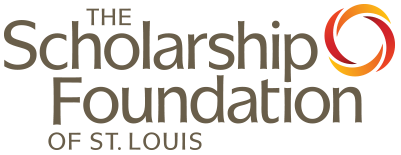
Some questions inspire startlingly simple answers. My grandfather had euphemisms at the ready for self-evident questions: “Is fat meat greasy?”, “Is the Pope Catholic?”, “Does a bear sh*t in the woods?”. Here are two from our work at The Scholarship Foundation of St. Louis:
Q. What do low-income students need?
A. Money
Q. Is college worth it?
A. Only if you’re learning
The further west the Greyhound progressed, the hotter and drier it got. Headed back to school in southern California (a 48-hour journey from St. Louis), my companion was Kierkegaard’s Fear and Trembling. Nearly 40 years later, I can still feel the frustration that such a relatively thin volume could be so dense and difficult.
My philosophy professor, Kevin O’Neill, was a brilliant teacher. His lectures were pure stand-up poetry. When he finished, the chalkboard was a work of art. He’d taught us a life-changing reading seminar – what to do when there’s more assigned than you can possibly read and the text is tough. I’d told my parents all about the powerful experience of studying philosophy. And when my second semester found me in some dark emotional moments, it was Kevin my parents called to ask if he could look in on me, take me to lunch. So, on the bus that day, my desire to make it through Fear and Trembling was largely a reflection of the relationship of trust and shared learning that college offered me.
I don’t know exactly how or why my third or fourth attempt into the text was breakthrough. The bus was parked at a rest stop and a lemony sun was rising. When I realized I was “getting it”, I did not want to look up, not even politely, as new passengers were boarding. I was not putting down the book, afraid I would lose the bits of understanding I’d gained. I was immersed in topics of anxiety, hope and memory, infinite resignation, and individual choice in the context of ethical authority.
There were so many other times when my learning was frustrated or might have seemed esoteric. Hundreds of pages in, I thought Tristram Shandy would never be born. I developed a healthy disdain for Sigmund Freud. I was shocked to learn that there are ecosystems dependent upon fire to germinate seeds. I researched Giotto and fresco technique, the history and culture of the Catalonian island of Menorca, and the educational philosophies of Rousseau and Locke. I had a professor, still a mentor and dear friend, who changed everything by a simple comment suggesting I had a gift for social sciences (something I had not noticed about myself just yet).
After 29 years at The Scholarship Foundation of St. Louis, I am still learning. I have a bachelor’s degree and a master’s in cultural anthropology. I’m not willing to draw straight lines from Kierkegaard to collective impact or Locke to planning a board meeting. Unlike plumbers or doctors, executive directors require no professional licensing or specific training to gain employment. Still, I’ve never been unemployed and I’ve never seen learning as just a classroom-based, formal activity. I’ve been in many meetings of professionals insisting that students choose degrees matched to specific career outcomes; always, a simple survey of those at the table reveals successful people with degrees in religion, history, literature, and other fields in which no specific job openings are advertised.
There are a host of reasons that we are seeing a resurgence of debate about the purpose of higher education. Drill and kill schooling and high-stakes testing have discouraged learning, created stress, and depressed young minds. Many colleges have adopted a business model that measures success on degrees granted and endowments raised rather than learning outcomes. At the post-secondary level, high sticker price has been conflated with quality, resulting in deeper class division and staggering student debt. We’ve created a false dichotomy between technical/career education and college. Life is more than work, and learning serves a purpose greater than job preparation.
Conjuring my grandfather and employing euphemisms, I’d answer the question of “Is college worth it?” with:
Have you ever seen a country more in need of critical thinking?
What strategy is most effective in addressing racial and economic inequities?
What kind of community or society do we wish to create?
– Faith Sandler

